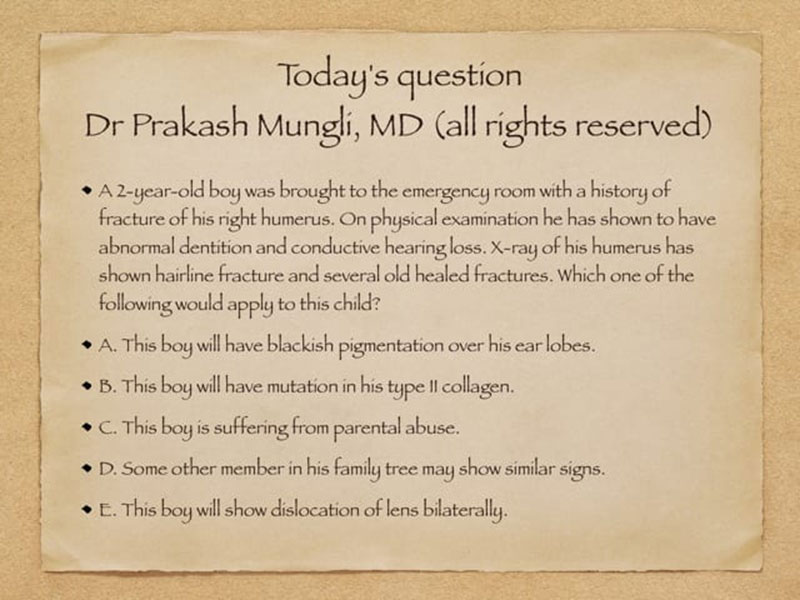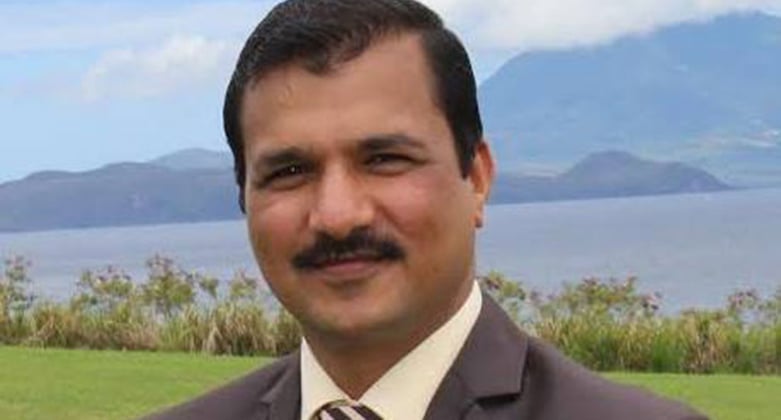UMHS professor Dr. Prakash Mungli is helping make a difference in both India and for students at Caribbean medical schools. He published a study on India’s Koraga community in an international medical journal. Dr. Mungli also gave a presentation on type 2 diabetes at the 20th International Conference on Yoga Research and Its Applications earlier this year in Bagalore, India.
In addition, Dr. Mungli continues to help UMHS students master biochemistry with his popular Facebook group, Biochemistry Made Easy, and keeps people informed with his blog, Medical Biochemistry Made Easy.
The UMHS Pulse examines these three highlights of Dr. Mungli’s dedication to medicine, science and medical education.
Study Published in International Medical Journal
Dr. Mungli, Course Director and Associate Professor of Biochemistry at UMHS, recently published a study on liver dysfunction, anemia and metabolic syndrome in the Koraga community in South Karnataka, India in the International Journal of AJ Institute of Medical Sciences, a biannual, peer-reviewed, indexed, scientific journal catering to all specialties of medical and allied health sciences.
Following are highlights from the abstract of the Koraga people study by Dr. Mungli and his group of researchers.
- Koraga community members are considered one of the primitive tribal groups (PTBs) deprived of social benefits.
- The study’s objective was the incidence of metabolic syndrome, anemia and altered liver function in the Koraga community.
Materials and methods:
- Routine health checkups were conducted exclusively for the Koraga community.
- Men and women of all ages were checked for height, weight, waist circumference, and blood pressure
- Hemoglobin, blood sugar, lipid profile and liver function parameters were assessed by collecting blood samples
- Body mass index (BMI) and waist-to-hip ratio (WHR) were calculated using anthropometric measurements to determine medical outcomes.
Results:
- Hemoglobin levels were found to be decreased. The group had a significant liver dysfunction.
Conclusion:
- The study indicated anemia in the females, and liver dysfunction in the community as a whole, mostly alcohol induced.
- The study “gives a clue towards presence of obesity in Koraga females, but to disprove the presence of metabolic syndrome in Koraga community, further studies are needed.”
See the full report online athttp://journal.ajmedicals.in/WebPages/ViewResearchPapers.aspx?issue=current
Dr. Mungli’s Presentation at 20th INCOFYRA in India
Dr. Mungli also gave an oral presentation at the 20th International Conference on Frontiers in Yoga Research and Its Applications (INCOFYRA) January 2 to 5, 2014 in Bangalore, India.
The presentation was on paraoxonase activity in type 2 diabetes mellitus patients with and without complications.
The conference’s theme looked at “the urgent need for collaborative actions involving health professionals from physicians of conventional medicine and traditional medicine, policy makers, government organizations and Industries to the protection of the health of our future generations.”
The focus was on “highlighting the importance of education – for health professionals and patients alike with diabetes as well as people at risk for diabetes,” aimed at reducing diabetes worldwide and “the role, safety and efficacy of yoga as a public health strategy in prevention and management of diabetes and its complications.”
Dr. Mungli’s Biochemistry Made Easy on Facebook & Medical Biochemistry Blog

A question from Dr. Mungli's blog, "Medical Biochemistry Made Easy."
Dr. Mungli has also created an innovative way for UMHS students to study. Back in 2010, he decided to create a Facebook group, Biochemistry Made Easy, because many students at international medical schools use Facebook as their main social networking site.
“The amount of time they spend in these sites varies from student to student but most of them do use these sites on a regular basis,” Dr. Mungli says. “As a creator and administrator of this page, I post USMLE-style biochemistry questions on a regular basis.”
Members receive notification when questions are posted. Interested members can participate in a discussion if they desire.
Biochemistry Made Easy currently has more than 1,640 members and it is continuously rising. Any member can add new member(s), but approvals are ultimately made by Dr. Mungli, the page administrator.
“The approval process for a member is to cross-check the credential of a member to see if he or she is in any way related to biochemistry,” Dr. Mungli says. “This way, the administrator of the page can oversee who joins the group and also the administrator can control the content being posted in the page. This will keep the page clean and restrict posts related to biochemistry.”
Dr. Mungli tells us that the purpose and operation of this page in sharing biochemistry knowledge was presented at the National Conference in Health Professions Education 2013 in Mumbai, India.
“One of my friends and previous colleagues presented this as a poster on behalf of me as I was unable to attend the conference due to my work schedule,” he says. “I'm planning to make a survey related to usefulness of this page among the members of the page and will be publishing the findings in medical education journals soon.”
Visit "Biochemistry Made Easy" at
https://www.facebook.com/groups/biochemistrymadeeasy/
Also visit Dr. Mungli’s blog “Medical Biochemistry Made Easy” at http://drmungli.blogspot.com/
(Top photo) Dr. Prakash Mungli. Photo: Courtesy of Dr. Mungli
About UMHS:
Built in the tradition of the best US universities, the University of Medicine and Health Sciencesfocuses on individual student attention, maintaining small class sizes and recruiting high-quality faculty. We call this unique approach, “personalized medical education,” and it’s what has led to our unprecedented 96% student retention rate, and outstanding residency placements across the US and Canada. UMHS is challenging everything you thought you knew about Caribbean medical schools.

Scott is Director of Digital Content & Alumni Communications Liaison at UMHS and editor of the UMHS Endeavour blog. When he's not writing about UMHS students, faculty, events, public health, alumni and UMHS research, he writes and edits Broadway theater reviews for a website he publishes in New York City, StageZine.com.















